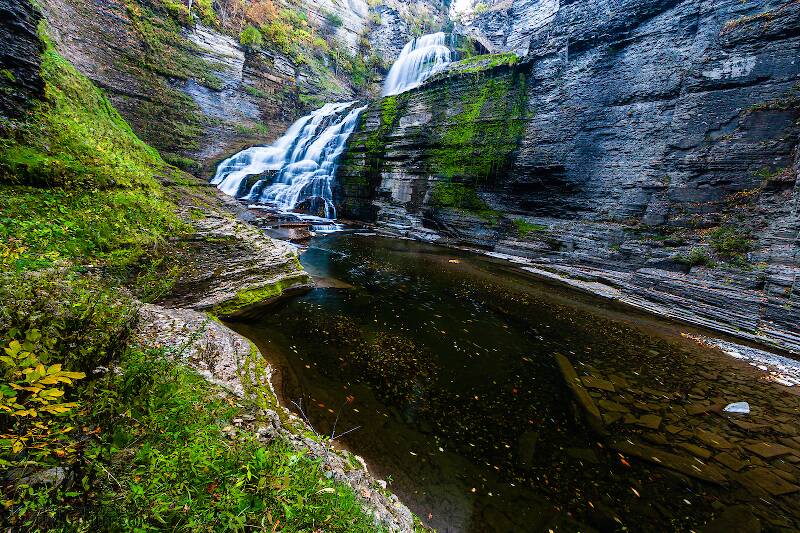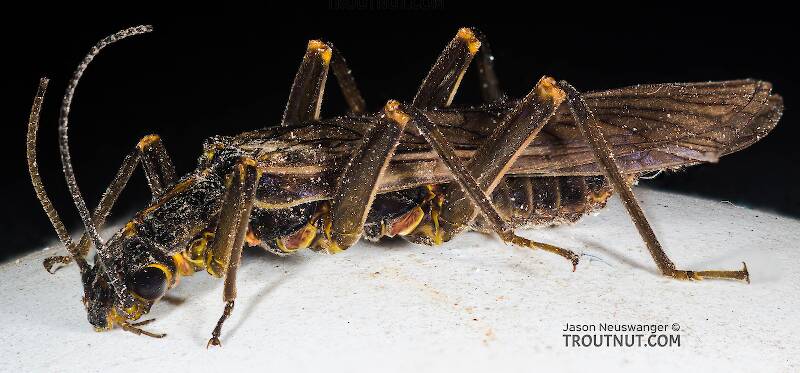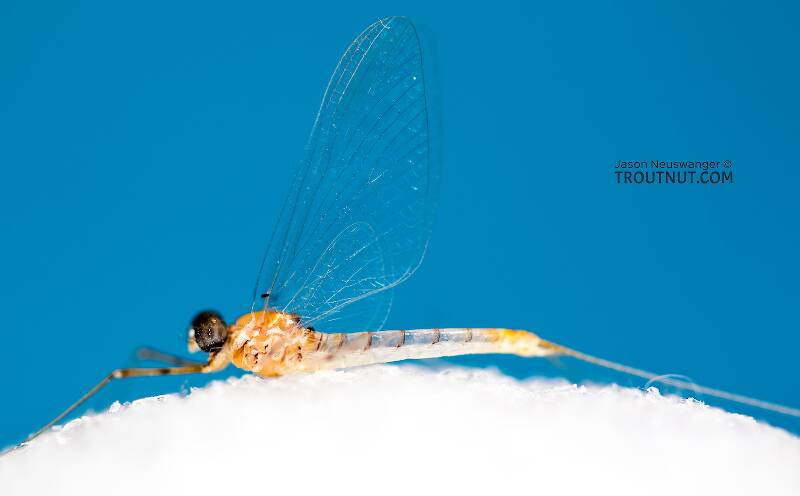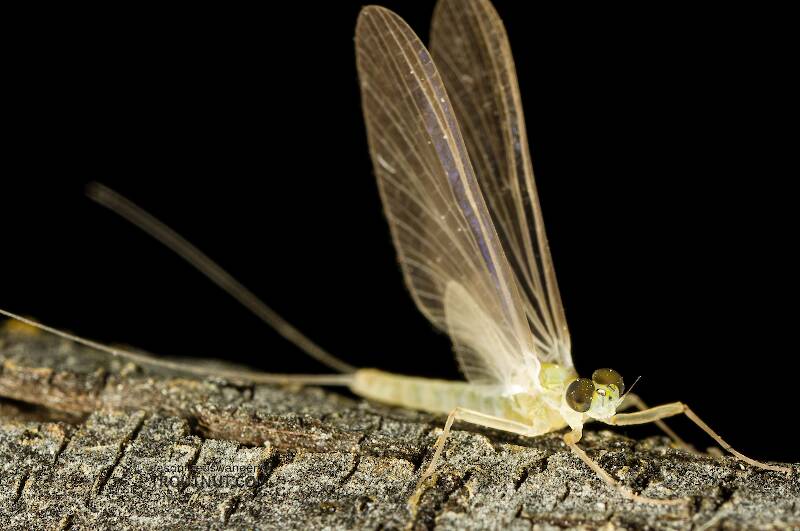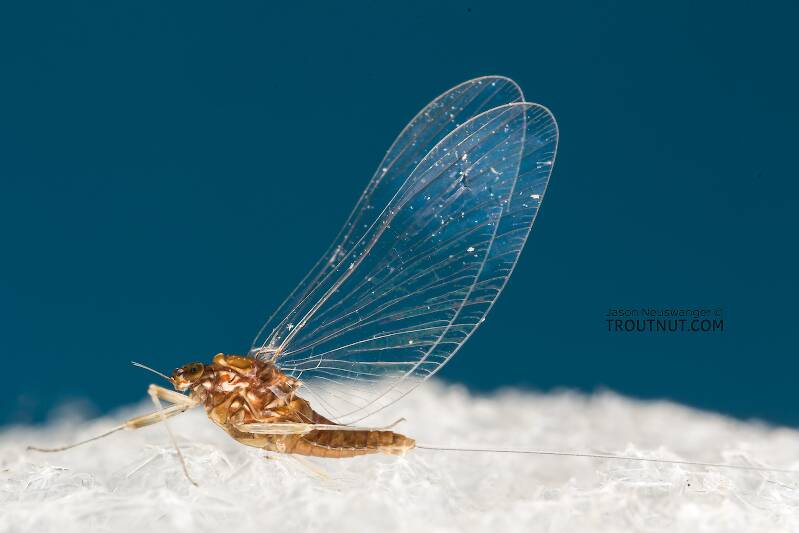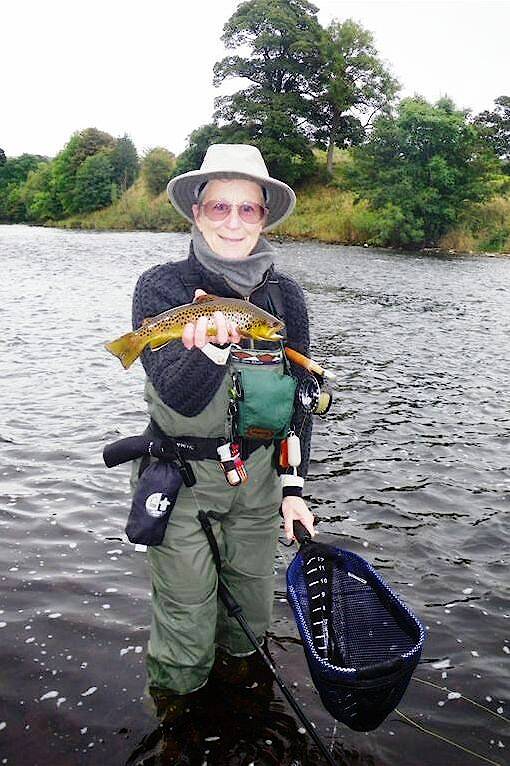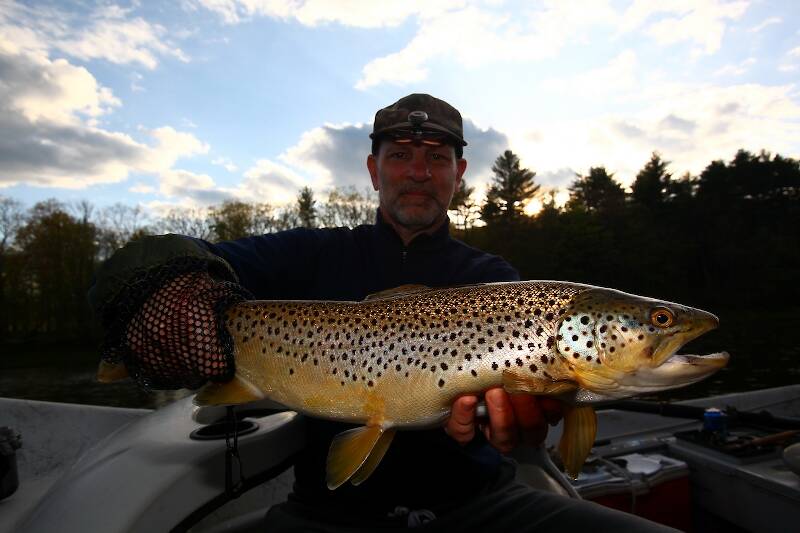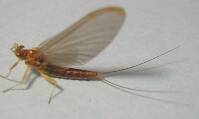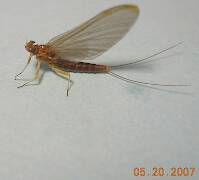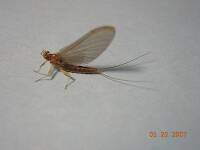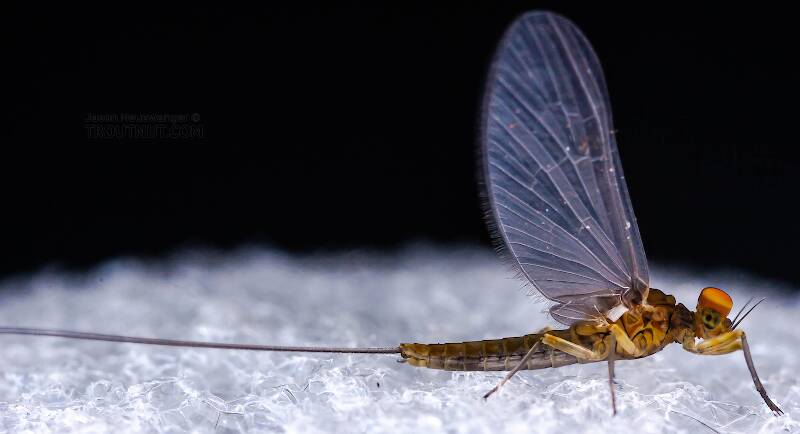
Blue-winged Olives
Baetis
Tiny Baetis mayflies are perhaps the most commonly encountered and imitated by anglers on all American trout streams due to their great abundance, widespread distribution, and trout-friendly emergence habits.
Featured on the forum

Troutnut is a project started in 2003 by salmonid ecologist Jason "Troutnut" Neuswanger to help anglers and
fly tyers unabashedly embrace the entomological side of the sport. Learn more about Troutnut or
support the project for an enhanced experience here.
This topic is about the Insect Order Ephemeroptera
Mayflies may be the most important insects for trout anglers to understand. They are an ancient order of insects, famous outside the fly-fishing world for their fragile beauty and short adult lifespan, often a single day to mate and die. The mayfly's poignant drama attracts poets and anglers alike, but anglers make the most of it.Mayflies live more than 99% of their lives as nymphs on the river or lake bottom, filling many crucial roles in freshwater ecosystems as they feed and grow. They eventually emerge from the water as winged sub-adults called "subimagos" by scientists and "duns" by anglers. Duns evolved to be good at escaping the water, with a hydrophobic surface and hardy build, but they are clumsy fliers. Within a day or two they molt one last time into "imagos" or "spinners," the mature adults, a transformation captured in this photo series of a dun molting into a spinner. They have longer legs and tails, and sleeker, more lightweight bodies, giving them the airborne speed, agility, and long grasp they need for their midair mating rituals. They are usually darker than the duns and have shinier, more transparent wings. They die within minutes or hours after mating.
Example specimens
CaseyP on May 17, 2007May 17th, 2007, 4:03 pm EDT
amazing sulphur hatch this evening on our favorite wee stream in PA, all just as you describe. thanks for the bug lessons this winter. a question: about half the spinners over the riffle had a little round yellow mass at the base of the tail. would that have been the eggs?
a fly note--had only parachute dries, no real spinner pattern, and so mushed down the 'chute to make it more wing-like. this made the fly ride crooked. suddenly the fish were more interested.
a fly note--had only parachute dries, no real spinner pattern, and so mushed down the 'chute to make it more wing-like. this made the fly ride crooked. suddenly the fish were more interested.
"You can observe a lot by watching." Yogi Berra
Troutnut on May 17, 2007May 17th, 2007, 4:10 pm EDT
Way to improvise. :)
The yellow balls were definitely the eggs.
The yellow balls were definitely the eggs.
Jason Neuswanger, Ph.D.
Troutnut and salmonid ecologist
Troutnut and salmonid ecologist
Martinlf on May 18, 2007May 18th, 2007, 11:49 am EDT
Casey, my experience is that a parachute can make a very effective spinner pattern, especially for dusk spinner falls, when I like a prominent white post for visibility. I do tie a few with very short posts, and you could even cut the post off if you think it is spooking fish, but most of my spinner parachutes have very visible wing posts. You can also cut a section of the hackle off at the front and (though I do this more rarely) at the back so the hackle looks more like spent wings. I use oversize hackle, and based on Rene Harrop's design for this fly often favor grizzly, though I'm sure dun is also a good choice.
"He spread them a yard and a half. 'And every one that got away is this big.'"
--Fred Chappell
--Fred Chappell
CaseyP on May 18, 2007May 18th, 2007, 5:32 pm EDT
today on the Little Juniata, we saw a sulphur hatch for the books--a very good thing they don't bite. the spent bugs and others in trouble on the water had very prominent wings, nothing like the flopped down ones on my (ineffective) standard pattern.
thanks for the advice, Martin. it's going to be parachutes all the way, a pair of sissors in my vest, and lopsided jury-rigged spinners next outing.
Jason--another question: in Mercersburg the spinners were butter colored, while on the Little J they were brownish, like butter in a saute pan. is this a species difference, or just local preference, like Pennsylvania liquor laws? two ridges away, and our flies just didn't match...
thanks for the advice, Martin. it's going to be parachutes all the way, a pair of sissors in my vest, and lopsided jury-rigged spinners next outing.
Jason--another question: in Mercersburg the spinners were butter colored, while on the Little J they were brownish, like butter in a saute pan. is this a species difference, or just local preference, like Pennsylvania liquor laws? two ridges away, and our flies just didn't match...
"You can observe a lot by watching." Yogi Berra
Troutnut on May 18, 2007May 18th, 2007, 5:39 pm EDT
Could be either. Ephemerella invaria is (ironically, given the name) an extremely variable species. Their spinners are mostly rusty brown but butter colored isn't out of the question at all.
Jason Neuswanger, Ph.D.
Troutnut and salmonid ecologist
Troutnut and salmonid ecologist
Martinlf on May 19, 2007May 19th, 2007, 1:36 am EDT
Casey, on Thursday a size 16 butter yellow biot bodied parachute with a white post, dun hackle, and a wood duck and antron shuck caught several nice fish on the Little J. I also used a size 14 emerger that had for the lower half of the body a brown biot, then the upper half a pale yellow biot, split cut wings and thorax hackle on a scud hook. The body was epoxied for strength, and I believe it had a bit of zelon shuck too. It worked as well. I switched to a size 14 tan parachute with oversize hackle and a white post to catch several others at dusk. There were a lot of bugs on the water. The key was an absolutely drag free drift, as usual. What kind of car do you drive, and will you be back up on the Little J soon? I'll look for you. Tight lines (once you connect, that is) and good luck!!
"He spread them a yard and a half. 'And every one that got away is this big.'"
--Fred Chappell
--Fred Chappell
GONZO on May 19, 2007May 19th, 2007, 7:35 am EDT
Casey,
Just as a general suggestion, a simple Synthetic Compara-dun tied with a pale gray wing and a yellow, yellow-brown, or even orange body can often do multiple duty for invaria hatches and spinner falls, imitating emergers or duns and upwing or spentwing spinners. The Synthetic Compara-dun presents all of these images at once and allows the fish to see what it needs to see. It often works on all but the fussiest fish. This single-fly strategy works a little better with light-winged species than it does with dark-winged varieties, but I've had it work for them as well. (Just to cover all bases, you could trail a sulphur nymph off the back in the early part of the hatch. This will take some of the fish that refuse the floater.)
Just as a general suggestion, a simple Synthetic Compara-dun tied with a pale gray wing and a yellow, yellow-brown, or even orange body can often do multiple duty for invaria hatches and spinner falls, imitating emergers or duns and upwing or spentwing spinners. The Synthetic Compara-dun presents all of these images at once and allows the fish to see what it needs to see. It often works on all but the fussiest fish. This single-fly strategy works a little better with light-winged species than it does with dark-winged varieties, but I've had it work for them as well. (Just to cover all bases, you could trail a sulphur nymph off the back in the early part of the hatch. This will take some of the fish that refuse the floater.)
CaseyP on May 19, 2007May 19th, 2007, 8:14 am EDT
thanks a lot for the suggestions. really appreciate the focus. last year i had great luck with a pink parachute yellow sulphur which with the appropriate tweaks you have suggested should make a difference.
my whine reminds me of another plaintive bleat heard on this forum early in the season, when one of our number, having done EVERYTHING right, failed to connect. my context is the trifecta the day before: a brown, a brookie, and a 19 inch rainbow all fell for my squashed fly in a span of about 20 minutes in a pool you could bridge with your dining room table 15 minutes from home.
when a minimum of effort is rewarded this way, and is followed by a day featuring a long drive to a famous body of water, a careful filling of fly box with every iteration of the hatch, and casting until one's arm is sore in the midst of an amazing show of nature's fecundity, all for one 10 inch brownie of no particular beauty, then one's universe gets tilted. thank you for setting it upright once more!
my whine reminds me of another plaintive bleat heard on this forum early in the season, when one of our number, having done EVERYTHING right, failed to connect. my context is the trifecta the day before: a brown, a brookie, and a 19 inch rainbow all fell for my squashed fly in a span of about 20 minutes in a pool you could bridge with your dining room table 15 minutes from home.
when a minimum of effort is rewarded this way, and is followed by a day featuring a long drive to a famous body of water, a careful filling of fly box with every iteration of the hatch, and casting until one's arm is sore in the midst of an amazing show of nature's fecundity, all for one 10 inch brownie of no particular beauty, then one's universe gets tilted. thank you for setting it upright once more!
"You can observe a lot by watching." Yogi Berra
Martinlf on May 20, 2007May 20th, 2007, 6:12 am EDT
Casey, recently I've had more long drives leading to less than spectacular results this season than last, and perhaps, than any previous season. Drawing on the wisdom of several folks who post here, I've worked hard to stay open to the "total experience," as you called it in another thread. To some degree it's worked, and, counting my blessings, I also find this season enriched with a number of new fishing buddies on this forum; Gonzo's flies, which have given new options and ideas about tying; better tippets (I think); and some new and stronger knots. I feel pretty lucky about these things.
"He spread them a yard and a half. 'And every one that got away is this big.'"
--Fred Chappell
--Fred Chappell
Quick Reply
Related Discussions
Topic
Replies
Last Reply
6
Nov 12, 2006
by Martinlf
by Martinlf
4
Sep 29, 2016
by Wiflyfisher
by Wiflyfisher
3
Jul 24, 2007
by Wiflyfisher
by Wiflyfisher
0
May 3, 2007
by Troutnut
by Troutnut

